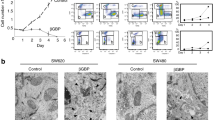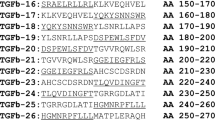Abstract
One aim of the genetic modification of tumor cells is the generation of immunogenic variants that can be used for the induction of immune responses against tumors. We engineered the human colorectal carcinoma cell line SW480 by means of plasmid transfection to secrete interleukin (IL)-2. Transfection of SW480 cells resulted in stable IL-2 secretion at 5–30 ng/ml per 105 cells in 24 h and, unexpectedly, in CD54 expression on the cell surface. SW480 variants expressing IL-2 and CD54 were tested for their capacity to induce T lymphocyte activation in vitro in comparison to untransfected and CD54 transfected cells. The cytolytic effector function of a class I MHC restricted CD8+, peptide antigen specific T cell clone was augmented following expression of CD54. IL-2 secreting SW480 variants did not further increase antigen-dependent cytolysis. Primary activation of resting T lymphocytes was assessed following allogeneic stimulation. When compared with unmodified SW480 cells, CD54 expressing variants did not initiate T cell proliferation. In contrast, IL-2 secreting SW480 cells strongly promoted primary T cell proliferation. Similarly, exogenous IL-2 and SW480 cells induced T cell pro liferatiowhich was not only due to IL-2 but was depen dent on tumor cells. However, following the initial wave of cell growth in response to IL-2 secreting SW480 cells T lymphocytes could not be restimulated with SW480 or IL-2 secreting variants and could not be further expanded. T cells initially activated by IL-2 secreting SW480 cells exhibited cytolytic activity towards SW480 cells. This reactivity, however, was transient and completely blocked by K562 cells, suggesting MHC-unrestricted, nonspecific cytotoxicity. We conclude that endogenous IL-2 secretion by the colorectal carcinoma cell line SW480 does not result in the activation of MHC restricted specific T lymphocytes but predominantly induces lymphokine-activated killer cells. Considering that tumor cell vaccines are aimed at inducing tumor-specific immune responses, our in vitro observation would rather argue against the in vivo application of such a tumor cell modification in colorectal cancer.
Similar content being viewed by others
Abbreviations
- IL :
-
Interleukin
- LAK :
-
Lymphokine-activated killer
- PBMC :
-
Peripheral blood mononuclear cells
References
Tepper RI, Mulé JJ (1994) Experimental and clinical studies of cytokine gene-modified tumor cells. Hum Gene Ther 5:153–164
Janssen RAJ, Mulder NH, The TH, de Leij L (1994) The immunobiological effects of interleukin-2 in vivo. Cancer Immunol Immunother 39:207–216
Negrier S, Philip TO (1993) Interleukin-2 and lymphokine activated killer (LAK) cells. In: Wagstaff J (ed) The role of interleukin-2 in the treatment of cancer patients. Kluwer, Dordrecht, pp 29–43
Stevens EJ, Jacknin L, Robbins PF, Kawakami Y, El Gamil M, Rosenberg SA, Yannelli JR (1995) Generation of tumor-specific CTLs from melanoma patients by using peripheral blood stimulated with allogeneic melanoma tumor cell lines. J Immunol 154:762–771
Sznol M (1995) Other cancers. In: De Vita VT, Hellman S, Rosenberg SA (eds) Biologic therapy of cancer, 2nd edn. Lippincott, Philadelphia, pp 269–278
Steis RG, Urba WJ, Van der Molen LA, Bookman MA, Smith JW II, Clark JW, Miller RL, Crum ED, Beckner SK, McKnight JE, Ozols RF, Stevenson HC, Young RC, Longo DL (1990) Intraperitoneal lymphokine-activated killer-cell and interleukin-2 therapy for malignancies limited to the peritoneal cavity. J Clin Oncol 8:1618–1629
Bednarek MA, Engl SA, Gammon MC, Lindquist JA, Porter G, Williamson AR, Zweerink HJ (1991) Soluble HLA-A2.1 restricted peptides that are recognized by influenza virus specific cytotoxic T lymphocytes. J Immunol Methods 139:41–47
Deuschle U, Pepperkok R, Wang F, Giordano TJ, McAllister WT, Ansorge W, Bujard H (1989) Regulated expression of foreign genes in mammalian cells under the control of coliphage T3 RNA polymerase and lac represser. Proc Natl Acad Sci USA 86:5400–5404
Meuer SC, Hussey RE, Fabbi M, Fox D, Acuto O, Fitzgerald KA, Hodgdon JC, Potentis JP, Schlossman SF, Reinherz EL (1984) An alternative pathway of T-cell activation: a functional role for the 50 kd T11 sheep erythrocyte receptor protein. Cell 36:897–906
Hérin M, Lemoine C, Weynants P, Vessière F, Van Pel A, Knuth A, Devos R, Boon T (1987) Production of stable cytolytic T-cell clones directed against autologous human melanoma. Int J Cancer 39:390–396
Guarini A, Gansbacher B, Cronin K, Fierro MT, Foa R (1995) IL-2 gene-transduced human HLA-A2 melanoma cells can generate a specific antitumor cytotoxic T-lymphocyte response. Cytokines Mol Ther 1:57–64
Schendel DJ, Gansbacher B (1993) Tumor-specific lysis of human renal cell carcinomas by tumor-infiltrating lymphocytes: modulation of recognition through retroviral transduction of tumor cells with interleukin 2 complementary DNA and exogenous alpha Interferon treatment. Cancer Res 53:4020–4025
Gansbacher B, Zier K, Cronin K, Hantzopoulos PA, Bouchard B, Houghton A, Gilboa E, Golde D (1992) Retroviral gene transfer induced constitutive expression of interleukin-2 or interferon-gamma in irradiated human melanoma cells. Blood 80:2817–2825
Belldegrun A, Tso C-L, Sakata T, Duckett T, Brunda MJ, Barsky HS, Chai J, Kaboo R, Lavey RS, McBride WH, deKernion JB (1993) Human renal carcinoma line transfected with interleukin-2 and/or Interferon alpha gene(s): implications for live cancer vaccines. J Natl Cancer Inst 85:207–216
Hathorn RW, Tso CL, Kaboo R, Pang S, Figlin R, Sawyers C, de Kernion JB, Belldegrun A (1994) In vitro modulation of the invasive and metastatic potentials of human renal cell carcinoma by interleukin-2 and/or interferon-alpha gene transfer. Cancer 74:1904–1911
Arienti F, Sulé-Suso J, Melani C, Maccalli C, Belli F, Illeini MT, Anichini A, Cascinelli N, Colombo MP, Parmiani G (1994) Interleukin-2 gene-transduced human melanoma cells efficiently stimulate MHC-unrestricted and MHC-restricted autologous lymphocytes. Hum Gene Ther 5:1139–1150
Anichini A, Mortarini R, Supino R, Parmiani G (1990) Human melanoma cells with high susceptibility to cell-mediated lysis can be identified on the basis of ICAM-1 phenotype, VLA profile and invasive ability. Int J Cancer 46:508–515
Anichini A, Mortarini R, Alberti S, Mantovani A, Parmiani G (1993) T-cell-receptor engagement and tumor ICAM-1 up-regulation are required to by-pass low susceptibility of melanoma cells to autologous CTL-mediated lysis. Int J Cancer 53: 994–1001
Fearon ER, Pardoll DM, Itaya T, Golumbek P, Levitsky HI, Simons JW, Karasuyama H, Vogelstein B, Frost P (1990) Interleukin-2 production by tumor cells bypasses T helper function in the generation of an antitumor response. Cell 60:397–403
Iwanuma Y, Kato K, Yagita H, Okumura K (1995) Induction of tumor-specific cytotoxic T lymphocytes and natural killer cells by tumor cells transfected with the interleukin-2 gene. Cancer Immunol Immunother 40:17–23
Tohmatsu A, Okino T, Stabach P, Padula SJ, Ergin MT, Mukherji B (1993) Analysis of cytolytic effector cell response in vitro against autologous human tumor cells genetically altered to synthesize interleukin-2. Immunol Lett 35:51–58
Kärre K (1993) Natural killer cells and the MHC I pathway of peptide presentation. Semin Immunol 5:127–145
Habicht A, Lindauer M, Galmbacher P, Rudy W, Gebert J, Schackert H-K, Meuer SC, Moebius U (1995) Developement of immunogenic colorectal cancer cell lines for vaccination: expression of CD80 (B7) is not sufficient to restore impaired primary T cell activation in vitro. Eur J Cancer (in press)
Yoo Y-K, Heo DS, Hata K, Van Thiel DH, Whiteside TL (1990) Tumor-infiltrating lymphocytes from human colon carcinomas. Functional and phenotypic characteristics after long-term culture in recombinant interleukin 2. Gastroenterology 98:259–268
Shimizu Y, Iwatsuki S, Heberman RB, Whiteside TL (1991) Effects of cytokines on in vitro growth of tumor-infiltrating lymphocytes obtained from human primary and metastatic liver tumors. Cancer Immunol Immunother 32:280–288
Kawakami Y, Haas GP, Lotze MT (1993) Expansion of tumorinfiltrating lymphocytes from human tumors using the T-cell growth factors interleukin-2 and interleukin-4. J Immunother 14:336–347
Zatloukal K, Schneeberger A, Berger M, Schmidt W, Koszik F, Kutil R, Gotten M, Wagner E, Buschle M, Maass G, Payer E, Stingl G, Birnstiel ML (1995) Elicitation of a systemic and protective anti-melanoma immune response by an IL-2-based vaccine. Assessment of critical cellular and molecular parameters. J Immunol 154:3406–3419
Author information
Authors and Affiliations
Rights and permissions
About this article
Cite this article
Lindauer, M., Schackert, H.K., Gebert, J. et al. Immune reactions induced by interleukin-2 transfected colorectal cancer cells in vitro: predominant induction of lymphokine-activated killer cells. J Mol Med 74, 43–49 (1996). https://doi.org/10.1007/BF00202071
Received:
Accepted:
Issue Date:
DOI: https://doi.org/10.1007/BF00202071




